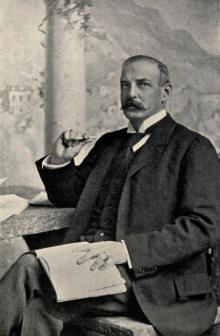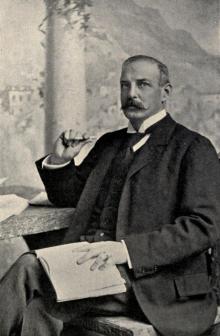Carlo Zeno, gentleman of Venice, ex-clerk, ex-gambler, ex-soldier of fortune, ex-lay prebendary of Patras, ex-duellist, and ex-Greek general, being about twenty-nine years of age, and having in his tough body the scars of half-a-dozen wounds that would have killed an ordinary man, had resolved to turn over a new leaf, had become a merchant, and was established in Constantinople in the year 1376. He had bought a house in the city itself because the merchants of Genoa all dwelt in the town of Pera, on the other side of the Golden Horn. A Venetian could not have lived in the same place with Genoese, for the air would have poisoned him, to a certainty; and besides, the sight of a Genoese face, the sound of the Genoese dialect, the smell of Genoese cookery, were all equally sickening to any one brought up in the lagoons. Genoa was not fit to be mentioned within hearing of polite Venetian ears, its very name was unspeakable by decent Venetian lips; and even to pronounce the syllables for purposes of business was horribly unlucky. Therefore Carlo Zeno and his friends had taken up their abode in the old city, amongst the Greeks and the Bokharians, the Jews and the Circassians, and they left the Genoese to themselves in Pera, pretending that they did not even exist. It was not always easy to keep up the pretence, it is true, for Zeno had extremely good eyes and could not help seeing those abominations of mankind on the other side of the Golden Horn when he sat in his balcony on spring evenings; and his only consolation was to dream of destroying them wholesale, of hewing them in pieces by the hundred and the thousand, and of piling up pyramids of their ugly grinning heads. Why were they Genoese? Carlo Zeno would rather have taken a box on the ear from Sultan Amurad, the Turk, over there in Asia Minor, than a civil word from the least objectionable of those utterly unspeakable monsters of Genoese. \'Behold,\' said Tertullian one day in scorn, \'how these Christians love one another.\' Matters had not improved in eleven hundred years, since that learned Doctor of the Church had departed this life, presumably for a more charitable world; but Carlo Zeno would have answered that the Genoese were no more Christians than mules, and much less so than the pigs, which are all under the special protection of the blessed Saint Anthony. At the very time, too, when my story begins, those obnoxious villains of Genoa were on the successful side of a revolution; for they had helped Emperor Andronicus to imprison his father, Emperor John, in the tall Amena tower on the north side of the city, by the Golden Horn, and to lock up his two younger brothers in a separate dungeon. It was true that Emperor John had ordered Andronicus and his little son of five to be blinded with boiling vinegar, but Genoese money had miraculously converted the vinegar into bland white wine, and had reduced the temperature from the boiling point to that of a healthful lotion, so that neither the boy nor the man were any the worse after the application than before; but Andronicus had resented the mere intention on the part of his father, and had avenged himself by taking the Empire, such as it was, for the present, while reserving the delight of murdering his parent and his brothers at a convenient season in the future. All this was very well, no doubt, and Andronicus was undisputed Emperor for the time being, because the Genoese and Sultan Amurad were willing that he should be; but Amurad had not always been his friend, and the Genoese had not always had the upper hand of the Venetians; the wind might change in a moment and a tempest might whirl him away from the throne even more quickly than the fair breeze had wafted him towards it. Zeno thought so too, and wondered whether it would please fate to make him the spirit of the storm.

 The Door to December
The Door to December Blood And Gold (The Vampire Chronicles #8)
Blood And Gold (The Vampire Chronicles #8) Drawing Blood
Drawing Blood Night of the Werecat
Night of the Werecat The Primadonna
The Primadonna The Model
The Model Blue Blood
Blue Blood The Adventures of Holly Weird, Zombie Slayer
The Adventures of Holly Weird, Zombie Slayer